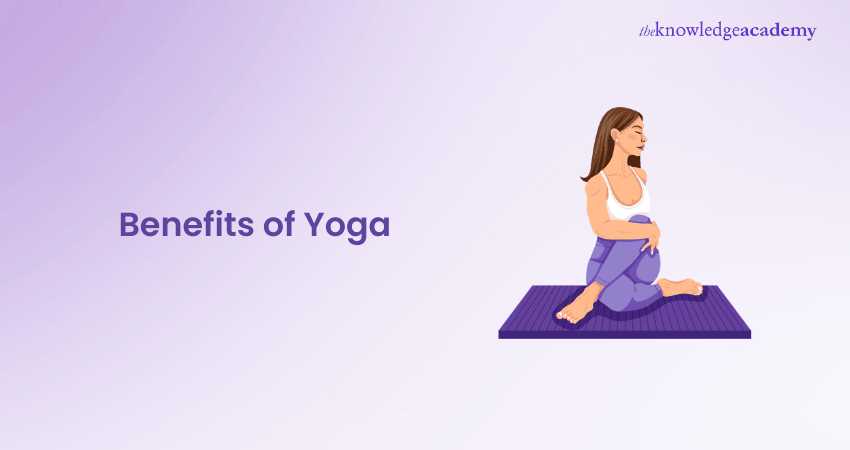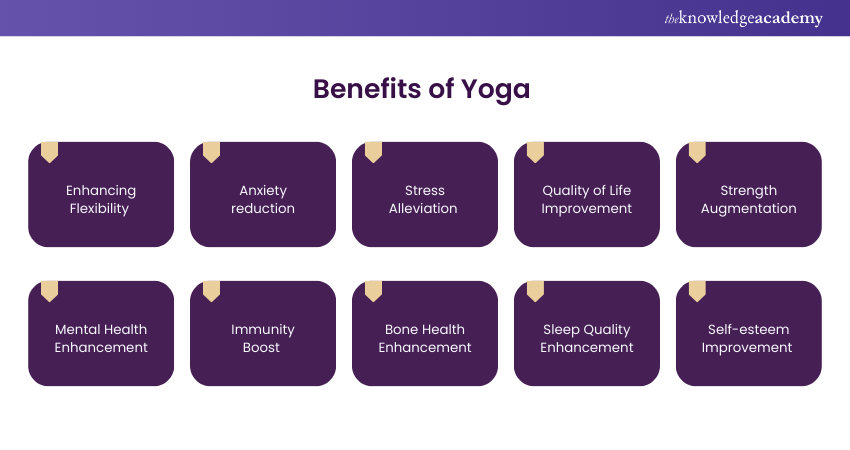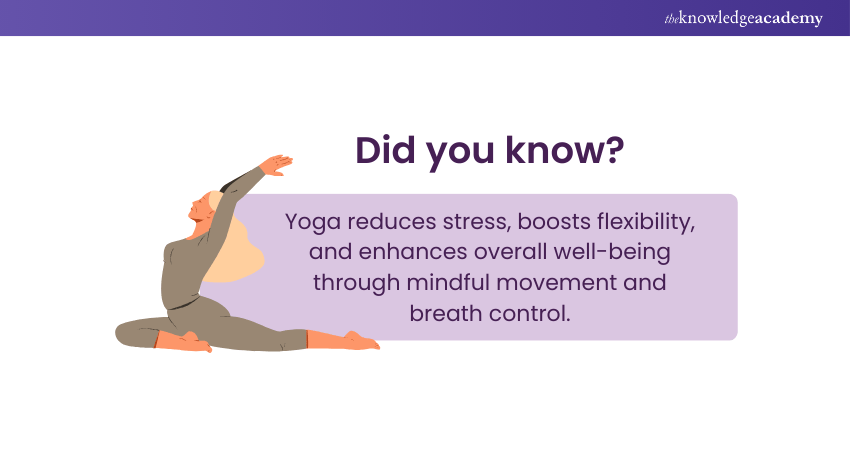We may not have the course you’re looking for. If you enquire or give us a call on 01344203999 and speak to our training experts, we may still be able to help with your training requirements.
We ensure quality, budget-alignment, and timely delivery by our expert instructors.

Yoga, an ancient practice rooted in Indian philosophy, transcends borders and captures hearts worldwide. Through a harmonious blend of postures (asanas), breathing techniques (pranayama), and meditation (dhyana), yoga offers a holistic approach to well-being. The Benefits of Yoga include stress and anxiety relief, improved focus, restful sleep, and a natural mood boost through increased serotonin production.
As we move through the asanas, we cultivate mindfulness and deepen our connection with our bodies. And guess what? These positive effects spill over into our eating habits and weight management. Ready to unroll your mat and explore the incredible Benefits of Yoga? Let’s embark on this transformative journey together.
Table of Contents
1) Benefits of Yoga
a) Enhancing Flexibility
b) Anxiety Reduction
c) Stress Alleviation
d) Quality of Life Improvement
e) Strength Augmentation
f) Immunity Boost
g) Bone health Enhancement
h) Sleep Quality Enhancement
i) Self-esteem Improvement
j) Brain Function Improvement
2) What Happens if I Do Yoga Every Day?
3) What are the Three Pillars of Yoga?
4) Conclusion
Benefits of Yoga
Yoga offers various benefits from, enhancing flexibility to boosting brain function. Below, we have discussed some of these benefits, pointing out how regular Yoga practice can transform one's health and life.

1) Enhancing Flexibility
Flexibility is one of the first evident advantages, which increases after practising yoga. You may find some poses difficult and impossible to do the first time you try them, but time helps your Muscles relax, making you more pliant. This results in increased flexibility that enables smooth movement and greatly enhances the reduction of incidences of injuries.
2) Anxiety Reduction
Yoga is renowned for its ability to soothe the mind and reduce feelings of anxiety. Through focused breathing and mindfulness practices, Yoga encourages mental relaxation. It also helps clear the mind from chaotic thoughts and provides a sense of calm and tranquillity. This mental clarity and peace effectively combat anxiety, making Yoga a valuable tool for emotional health.
3) Stress Alleviation
Closely linked to its anxiety-reducing capabilities, Yoga is also an effective stress reliever. The practice promotes relaxation through deep breathing and Meditation, which lowers cortisol levels, the body's stress hormone. This reduction in cortisol not only alleviates stress but also mitigates the physical and Mental Health Issues associated with chronic stress, as explained in the Yoga for Stress Management Guide.
4) Quality of Life Improvement
Yoga's holistic approach to well-being enhances the quality of life. It improves physical health, mental clarity, and emotional stability. This collectively contributes to a more positive and fulfilled life experience. Yoga has been shown to improve overall life satisfaction and resilience for those dealing with chronic conditions or recovering from illnesses.
5) Strength Augmentation
While Yoga is often praised for its flexibility benefits, it is also an effective way to build strength. Many Yoga poses require supporting the body's weight in novel ways.This includes balancing on one leg or supporting oneself with the arms. Over time, these poses build muscle strength in the legs, arms, back, and abdomen.
6) Immunity Boost
Regular Yoga practice has been integral to an enhanced immune system. By lowering stress levels, Yoga prevents the stress-induced impairment of the immune system and promotes better overall health. Furthermore, certain Yoga practices are known to improve the functioning of specific organs and systems, further strengthening the body's defence against illnesses.
7) Bone Health Enhancement
Yoga supports bone health by improving posture, balance, and alignment while increasing bone density through weight-bearing poses. Regular practice can help reduce the risk of osteoporosis and fractures, making it a valuable addition to overall musculoskeletal well-being.
8) Sleep Quality Enhancement
Yoga can significantly improve sleep quality due to its stress-reducing effects and its ability to normalise sleep patterns. Practices like meditation and relaxation Yoga help calm the mind and prepare the body for rest. This makes it easier to fall asleep and enjoy a more restorative sleep.
9) Self-esteem Improvement
Regular yoga practice increases self-awareness and promotes a positive body image, which boosts self-esteem. By encouraging self-care and promoting physical and mental balance, yoga helps individuals develop a more positive outlook on themselves and their bodies.
Learn how to live a Healthy Lifestyle with our Healthy Lifestyles Training – join now!
10) Brain Function Improvement
Yoga benefits cognitive function, enhancing concentration, memory, and learning. Practices that require focus and meditation improve neural connections, leading to better cognitive abilities. This is particularly beneficial as one ages, helping to keep the mind sharp and attentive.
11) Inflammation Reduction
Yoga helps lower stress-induced inflammation by promoting relaxation and reducing cortisol levels. While it is not a cure for inflammatory conditions like cancer or diabetes, regular practice supports a balanced immune response and can complement medical treatments for overall well-being.
12) Balance Improvement
Yoga improves physical balance and coordination, which is crucial for preventing falls and maintaining mobility, especially in older adults. Standing and balancing poses strengthen the muscles used for balance, which enhances overall stability and posture.
13) Improved Digestion
Yoga can improve digestive health. Specific Yoga poses like twists and forward bends stimulate the digestive organs. This enhances their efficiency and helps to alleviate issues like constipation and bloating. Furthermore, the stress-reducing effects of Yoga can prevent stress-induced digestive problems, promoting a healthy gut environment.
14) Cardiovascular Health Enhancement
Regular Yoga practice has a good impact on cardiovascular health. It lowers blood pressure, reduces cholesterol levels, and improves circulation, decreasing the risk of heart disease. Yoga's breathing exercises enhance lung capacity and efficiency, which benefits heart health.

15) Pain Management
Yoga can help manage chronic pain by improving flexibility and mobility and reducing stress-related pain responses. While it provides relief for conditions like arthritis and fibromyalgia, it should be used as a complementary practice alongside medical treatment, not a replacement.
16) Detoxification of the Body
Yoga does not "detoxify" the body in a literal sense. However, certain postures and breathing techniques enhance lymphatic drainage, improve circulation, and support the body's natural detoxification processes. This can aid organ function and overall well-being.
17) Weight Management
Yoga supports weight management by enhancing metabolism, reducing stress-related eating, and increasing body awareness. While all yoga styles contribute to overall well-being, more dynamic forms like Vinyasa and Ashtanga are particularly effective for calorie burning and physical conditioning. Understanding the difference between Hatha Yoga and Vinyasa will help you choose the best practice for your fitness goals—Vinyasa being the more active, calorie-burning option.
18) Ageing Gracefully
Regular Yoga supports healthy ageing by maintaining physical mobility and mental clarity and reducing the risk of age-related diseases. Yoga's emphasis on balance and flexibility helps older adults maintain independence, while meditation and mindfulness contribute to cognitive health.
Are you interested in learning more about Yoga? Then sign up for our Yoga Training now!
19) Emotional Balance
Yoga fosters emotional stability and resilience. By promoting mindfulness and present-moment awareness, Yoga helps individuals manage their emotions more effectively, which leads to improved emotional responses and reduced impulsivity.
20) Enhanced Concentration and Focus
Yoga improves concentration and focus through practices that require mental steadiness and attention. This enhanced mental discipline can be applied to various aspects of life, improving productivity and efficiency.
21) Cultivation of Mindfulness
The practice of Yoga encourages a state of mindfulness, where attention is focused on the present moment in a non-judgmental manner. This mindfulness leads to a deeper connection with oneself, fostering a greater appreciation for life's experiences. It also reduces the tendency toward negative thought patterns.
22) Community and Connection
Participating in Yoga classes or groups can foster community and belonging. Sharing the practice with others creates a supportive environment that encourages personal growth and connectedness, contributing to overall well-being.
What Happens if I Do Yoga Every Day?
Practicing Yoga daily boosts flexibility, strength, and posture while reducing stress and enhancing focus. It improves circulation, digestion, and energy levels. Over time, it promotes mindfulness, better sleep, and emotional balance, fostering overall well-being and a healthier, more active lifestyle.
What are the Three Pillars of Yoga?
The three pillars of Yoga are Asana (Postures) for physical strength and flexibility, Pranayama (Breath Control) to enhance energy and focus, and Dhyana (Meditation) for inner peace and mindfulness. Together, they create a balance between body, mind, and spirit, promoting overall well-being and a harmonious life.
Practice Meditation to improve your concentration power – join our Meditation Course now!
Conclusion
The Benefits of Yoga extend beyond the mat, enhancing physical health, mental clarity, and emotional balance. By improving digestion, boosting immunity, and fostering mindfulness, yoga supports overall well-being. Embrace these benefits today and embark on a journey toward a healthier, more balanced life!
Do you want to learn more about Nutrition and how to maintain your Fitness? Sign up for our Nutrition and Fitness Training now!
Frequently Asked Questions
What Does Yoga Do to Your Body?

Yoga enhances flexibility, strength, and posture while improving circulation, digestion, and lung capacity. It reduces stress, boosts immunity, and promotes better sleep. Regular practice supports joint health, relieves tension, and fosters overall physical and mental well-being.
What are the 4 Dimensions of Yoga?

The four dimensions of Yoga are Bhakti (Devotion) for emotional well-being, Jnana (Knowledge) for wisdom, Karma (Action) for selfless service, and Raja (Meditation & Discipline) for mental control. These dimensions work together to create physical, mental, and spiritual balance.
What are the Other Resources and Offers Provided by The Knowledge Academy?

The Knowledge Academy takes global learning to new heights, offering over 3,000 online courses across 490+ locations in 190+ countries. This expansive reach ensures accessibility and convenience for learners worldwide.
Alongside our diverse Online Course Catalogue, encompassing 19 major categories, we go the extra mile by providing a plethora of free educational Online Resources like News updates, Blogs, videos, webinars, and interview questions. Tailoring learning experiences further, professionals can maximise value with customisable Course Bundles of TKA.
What is The Knowledge Pass, and How Does it Work?

The Knowledge Academy’s Knowledge Pass, a prepaid voucher, adds another layer of flexibility, allowing course bookings over a 12-month period. Join us on a journey where education knows no bounds.
What are the Related Courses and Blogs Provided by The Knowledge Academy?

The Knowledge Academy offers various Healthy Lifestyles Courses, including Yoga Masterclass, Active and Healthy Lifestyles Training, and Develop Cognitive Behavioural Therapy Training. These courses cater to different skill levels, providing comprehensive insights into different Types of Yoga.
Our Health and Safety Blogs covers a range of topics related to Yoga, offering valuable resources, best practices, and industry insights. Whether you are a beginner or looking to advance your Yoga skills, The Knowledge Academy's diverse courses and informative blogs have you covered.
Upcoming Health & Safety Resources Batches & Dates
Date
 Life Coach Training
Life Coach Training
Fri 11th Apr 2025
Fri 13th Jun 2025
Fri 15th Aug 2025
Fri 10th Oct 2025
Fri 12th Dec 2025






 Top Rated Course
Top Rated Course



 If you wish to make any changes to your course, please
If you wish to make any changes to your course, please


